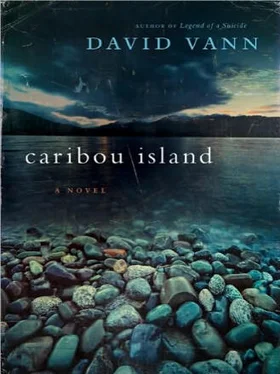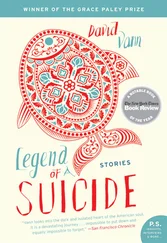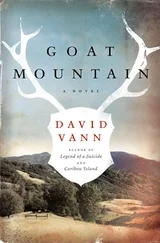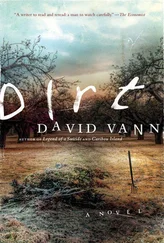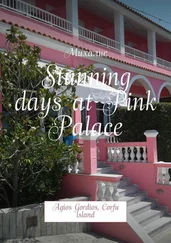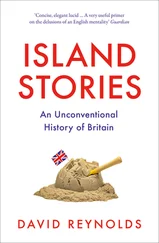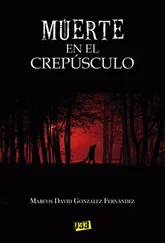Gary dragged the logs ashore until all were lying in rows and small stacks. He tromped through low thickets to the building site, carrying a shovel. He was keeping this simple. He’d just clear some ground here in a rectangle, even it out, and bury the first logs partway into the dirt. No other foundation, because it wasn’t necessary. The point was to build a cabin the way it used to be done. No cement pad, no permits. The cabin itself an expression of a man, a form of his own mind.
He looked at the lake, checking the view, checking perspective, shifting a few feet this way and that to make sure he had it right, then he dove the shovel into what would be the center. Breaking ground, he said. Finally. After about thirty years. How the hell does that happen?
Then he walked three paces to the side, made another mark, and walked three paces to the other side. A cabin six paces wide, and he’d make it four paces deep. No measuring tape. Just walk it out. With the sides marked, he made corners.
Okay, he said, standing in the middle again. His left shoulder ached, bursitis from years ago that acted up whenever he worked. He hiked over to a spruce tree and braced his hand against that to give his shoulder a good stretch. Then he stretched the other arm and shoulder, and stretched his legs a bit, too. He was starting this project so late in the season, he didn’t have time for injuries. All had to go smoothly. It was mid-August already. He had meant to start in late May.
He hiked back to the cabin site and cleared all the dead wood, throwing branches and also a few stones. Then he dug in with the shovel. Dark earth, rich and airy, but so many runners and roots he could never get a shovelful. A rake might have been more helpful. Something to rip all this stuff out. He had good gloves, so he kneeled down and raked with his fingers, pulled and yanked and found all of it far more resilient than expected. Tough little buggers, he said.
He stood and tried the shovel again, used it to chop. That seemed to work. So he chopped along the outside of his cabin, the entire boundary, the mosquitoes hounding him now, all over his face and neck, slowing the work with all the swatting he had to do.
He dropped to his knees and pulled at the growth he had chopped free, but some of it was still anchored, so he was chopping and digging again with the shovel, the entire area a thick mat of growth, really, and he began to wonder whether he should have just used this as the floor and built on top. Why was dirt better? This entire area was going to become a mud pit when it rained.
Gary lay back in the dirt and closed his eyes. The smell of the earth, wood rot, skunk cabbage. Buzzing of mosquitoes in his ears. He was wearing repellent, but they were undeterred as usual. He opened his eyes, and the sky was spinning. His pulse going in his temples, his head feeling a little dizzy.
Thirty years ago, this place had been new. And he’d been younger, the dream still fresh, still reachable. The air clearer, mountains cut more sharply against the sky, the forest more alive. Something like that. Some animated sense of the world that dissipates over time. We’re given a gift but it’s a fragile one, impermanent. Now this place was closer to an idea, hollowed out, lacking substance. Reduced to mosquitoes and a tired old body and ordinary air. He was supposed to live out here, but he was supposed to have done it back then.
Irene thought he was just being bitter, some character flaw. She couldn’t see the shape of the world, the shape of a life. She didn’t understand the enormous differences. He should have gone for someone smarter, but instead he went for someone safe. And his life made smaller because of that.
But he needed to focus. I need to think this out, he said aloud, and he tried to think clearly. He was making a mud pit. The logs set into it would form dams, a kind of pool for gathering water. He was making a cistern, not a cabin. But then his thoughts were wandering to his lunch, to Irene and her headache, to Rhoda and whether she or Mark might ever come out here to help. Meandering, slipping, unable to focus. A once-clear mind reduced.
Okay, he said. A platform, I need a platform. And he could see this was true. A wooden platform, a floor, raised up about six inches off the ground, leveled out. Then he’d build his walls around this.
So he stood up and decided to go for a hike. It was too late today to get materials for the platform, so he might as well explore the island a little.
He tromped up to the birch trees at the back of his property and continued on until he found a path. Much easier to follow this, a game trail, the ground more level. Birch and spruce all through here, no view of the water, and he came upon an empty cabin. A log cabin, like what he had imagined, their logs much bigger than his, about a foot thick. He wondered where they had found those. He came up close to examine, tried to figure out how they got the logs to fit so well. Something in the gaps, but he couldn’t tell what it was. Covered in moss now and cobwebs. He peered in a small window and could see a white basin, a dark wood-burning stove. He walked around back, a big cabin, two other rooms, and peered in more windows, tried to see the floor. Looked like boards. Then he knelt down all around the edges, tried to find a clue for how the walls met the floor, but there were no gaps in the walls, nothing to see.
Well, he said, and stood back up. This will be good for a reference. And he wondered why anyone would build here. No water view, just an outpost in the trees. No wonder it was empty. He could do better than this.
Irene waited alone all day, lying in bed, looking at the boards of the ceiling. Her husband out on that island, her children working, the Vicodin making her nauseated and weak, clammy. The room too bright in the sun, but she didn’t have the energy to get up and close the curtains. No one cared what happened to her here. She might as well die.
Self-pity, she said aloud. Not a pretty thing. And this felt too close to the years after her mother was gone, after her father was gone. Moving from one distant family member to the next, shuffled around in Canada and then California, unwanted, too often alone.
She popped another Vicodin, the pain mounting to a breaking point again, and she didn’t feel anything at first, but after fifteen or twenty minutes, she could feel the cold, prickly slide into nausea and oblivion, a welcome relief. Her head went away, or her awareness of it, and she was left pooling in the rest of her body. She’d gone heavy, sinking deep into the mattress.
Almost like diving when she closed her eyes, the surface far away above. An ocean with a heartbeat, slow waves of pressure, water compacting but no edge to it. No contact with the surface. The world of air a world of myth only, storms and lightning and sun. The only reality the density of the water, the coolness of it, the pressure and weight of it.
Irene awoke hours later. The pain returned, sharp and jagged, slicing through her head.
Gary, she called out, and this time she heard a response. A rustling in the kitchen, and he opened the bedroom door.
How are you feeling? he asked.
I need another Vicodin. I’m really scared. The pain is something else.
I think you should wait a while if you can. You’re not supposed to have more than four of those per day, according to Rhoda. And the doctor didn’t think you needed them.
The pain is too much, Gary.
Maybe some hot food. Maybe some food and water and that will help a bit. What would you like?
Irene couldn’t breathe. She turned on her side, and that only made the pain and breathing worse. I can try, she said. I just want this to end.
I’ve been thawing out some venison. I’ll cook that up with mashed potatoes. You need to eat more.
Читать дальше
